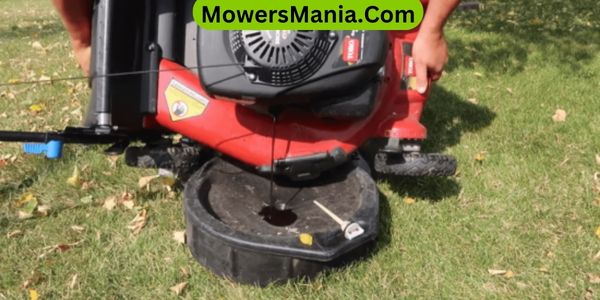You might be wondering, ‘How can I tell if my lawn mower is low on oil?’ Well, there are a few clear signs to watch out for.
When your lawn mower is low on oil, the engine may overheat, emit more exhaust smoke, or make unusual noises.
You might also experience difficulty starting the mower, notice reduced performance, or discover oil leaks.

It’s important to keep an eye out for these indicators to prevent potential damage to your lawn mower’s engine.
Engine Overheating
If your lawn mower’s engine is overheating, it may be a sign of low oil levels. When the oil levels are insufficient, the engine components experience increased friction and heat, leading to overheating. This can cause damage to the engine if not addressed promptly.
To check the oil level, locate the oil dipstick, remove it, and wipe off any oil on it. Then, reinsert the dipstick all the way back in and pull it out again to see the oil level.
If it’s below the recommended level, it’s essential to add the appropriate type of oil for your lawn mower. Refer to the manufacturer’s guidelines for the correct oil type and amount.
Additionally, inspect the oil for any discoloration or metal particles, as these could indicate serious engine issues.
Regularly checking and maintaining the oil level in your lawn mower is crucial for preventing engine overheating and ensuring its longevity. Remember to follow the manufacturer’s recommended oil change schedule to keep the engine running smoothly.
Increased Exhaust Smoke
If you notice increased exhaust smoke coming from your lawn mower, it could be a sign of low oil.
Excessive exhaust smoke, whether it’s blue or black, indicates potential oil issues.
Keep an eye out for this warning sign and address any oil-related problems promptly to keep your lawn mower running smoothly.
Excessive Exhaust Smoke
When experiencing excessive exhaust smoke from your lawn mower, check the oil level immediately to prevent potential engine damage. Excessive exhaust smoke, especially if it’s blue or white in color, can indicate that the engine is burning oil.
This could be due to low oil levels, which can lead to increased friction and heat within the engine. The excess heat can cause damage to the engine components and reduce its lifespan.
Additionally, excessive exhaust smoke can also be a sign of other issues such as worn piston rings, a clogged crankcase breather, or a damaged cylinder wall.
It’s crucial to address the root cause of the excessive exhaust smoke promptly to avoid costly repairs and ensure the continued smooth operation of your lawn mower.
Blue or Black Smoke
Experiencing blue or black smoke coming from your lawn mower’s exhaust indicates a potential issue with the oil level, which can lead to engine damage if not addressed promptly.
When oil levels are low, the engine can start burning oil along with the fuel, resulting in the production of blue or black smoke. This is a clear sign that the oil isn’t lubricating the engine properly, causing excessive friction and heat.
If left unchecked, this can lead to serious internal damage to the engine components. Therefore, it’s crucial to check the oil level and top it up if necessary.
Additionally, it’s important to inspect for any leaks or other potential causes of oil loss to ensure the proper functioning of your lawn mower and prevent costly repairs.
Unusual Engine Noises

Check for unusual engine noises, which can indicate low oil levels in your lawn mower. If you hear knocking, clanking, or grinding sounds coming from the engine, it could be a sign of insufficient lubrication due to low oil levels.
Ignoring these noises can lead to severe damage to the engine components, resulting in costly repairs or even the need for a replacement mower. It’s crucial to address the issue promptly by checking the oil level and adding more if necessary.
To help you understand the significance of unusual engine noises, consider the following table:
| Engine Noise | Possible Cause |
|---|---|
| Knocking | Insufficient lubrication due to low oil levels |
| Clanking | Lack of proper oil circulation in the engine |
| Grinding | Metal-on-metal contact due to inadequate lubrication |
Difficulty Starting
If your lawn mower is having difficulty starting, it may be a sign of low oil. The engine might struggle to turn over, and you may notice unusual noises coming from the mower.
Additionally, the engine may overheat more quickly, signaling a potential issue with oil levels.
Engine Struggles to Start
When your lawn mower is low on oil, it can cause the engine to struggle to start, leading to potential damage if not addressed promptly. If you notice that your mower is having difficulty starting, especially after being left unused for a while, low oil levels could be the culprit.
Insufficient oil can lead to increased friction and heat within the engine, making it harder to turn over and start. This can result in excessive wear and tear on engine components, potentially causing long-term damage.
It’s crucial to check the oil level regularly and top it up as needed to ensure smooth starting and prevent costly repairs. Remember, maintaining the proper oil level is essential for the overall health and performance of your lawn mower.
Unusual Engine Noises
Struggling to start and emitting unusual noises, your lawn mower’s engine may indicate low oil levels, potentially leading to costly damage if not addressed promptly. When the engine makes grinding or knocking sounds, it could be a sign of insufficient lubrication due to low oil levels.
Additionally, a whining or whirring noise may suggest that the engine’s internal components are experiencing excessive friction, often caused by inadequate oil. Furthermore, if the engine struggles to turn over or requires multiple attempts to start, it could be due to the lack of proper lubrication from low oil levels.
These unusual engine noises and difficulties in starting should prompt you to check the oil levels immediately and top it up if necessary to prevent further damage.
Engine Overheats Quickly
Experiencing quick engine overheating and difficulty starting could indicate low oil levels in your lawn mower. When the oil level is low, the engine components experience increased friction and heat, leading to overheating.
Additionally, low oil levels can cause starting issues as the engine struggles to operate without proper lubrication.
To prevent further damage to your lawn mower, it’s crucial to check the oil level and top it up if necessary. Refer to the table below for a quick reference on the signs of low oil in a lawn mower.
| Signs of Low Oil in a Lawn Mower |
|---|
| Quick engine overheating |
| Difficulty starting |
| Increased engine friction |
| Audible knocking or tapping sounds |
| Excessive exhaust smoke |
Reduced Performance
If your lawn mower’s performance has noticeably decreased, it may be a sign of low oil levels. When your mower’s oil is low, it can lead to a range of issues that affect its overall performance.
Here are the signs to look out for:
- Reduced Power: Low oil levels can cause the engine to work harder, leading to a decrease in power output. You may notice that the mower struggles to cut through thick or tall grass.
- Engine Stalling: Insufficient oil can result in the engine stalling frequently during operation. This can disrupt the mowing process and lead to frustration.
- Increased Exhaust Emissions: When the oil level is low, the engine may produce darker or more pungent exhaust emissions. This change in exhaust can indicate a decrease in engine efficiency and performance.
Keeping an eye on your lawn mower’s performance can help you catch low oil levels before they cause significant damage. Regularly checking and maintaining the oil levels will ensure that your mower runs smoothly and performs optimally.
Oil Leaks

Check for oil leaks underneath your lawn mower as a sign of low oil levels. A common indication of low oil in a lawn mower is the presence of oil leaks around the engine or underneath the mower.
If you notice oil spots or puddles forming underneath the mower after use, it’s a strong indicator that the oil levels are low and need to be replenished. The leaks may occur due to worn-out seals, gaskets, or damaged components, which can lead to oil seepage.
Addressing oil leaks promptly is crucial to prevent engine damage and maintain optimal performance.
To identify the source of the oil leaks, inspect the mower’s engine, especially around the oil drain plug, oil filter, and other potential areas where leaks can occur. Tighten loose fittings, replace damaged seals or gaskets, and ensure proper installation of the oil filter to prevent leaks.
Additionally, regularly checking for oil leaks and addressing them immediately can help maintain the overall health and performance of your lawn mower.
Frequently Asked Questions [FAQs]
Can Using the Wrong Type of Oil Cause Low Oil Levels in a Lawn Mower?
Using the wrong type of oil can cause low oil levels in a lawn mower. It’s important to use the recommended oil to ensure proper lubrication and prevent engine damage. Check the manufacturer’s guidelines for the correct oil type.
How Often Should I Check the Oil Level in My Lawn Mower?
You should check the oil level in your lawn mower at least once a month. It’s important to keep the oil at the proper level to ensure your mower runs smoothly and to prevent potential damage.
Can Low Oil Levels in a Lawn Mower Cause Damage to the Engine?
Yes, low oil levels in a lawn mower can cause serious damage to the engine. It’s important to regularly check and maintain the oil level to ensure optimal performance and prevent costly repairs.
What Should I Do if I Notice Low Oil Levels in My Lawn Mower?
If you notice low oil levels in your lawn mower, immediately add more oil to the appropriate level indicated in the owner’s manual. Running the mower with low oil can cause serious damage to the engine.
Are There Any Additives I Can Use to Prevent Low Oil Levels in My Lawn Mower?
You can use oil additives to help prevent low oil levels in your lawn mower. They can improve oil viscosity, reduce friction, and protect the engine from wear. Remember to regularly check the oil level to ensure proper maintenance.
Conclusion
So, if you notice your lawn mower experiencing engine overheating, increased exhaust smoke, unusual engine noises, difficulty starting, reduced performance, or oil leaks, it may be a sign of low oil.
Make sure to regularly check and maintain the oil levels in your lawn mower to keep it running smoothly and efficiently.
Don’t ignore these signs, as addressing them promptly can prevent damage to your mower and save you money in the long run.



